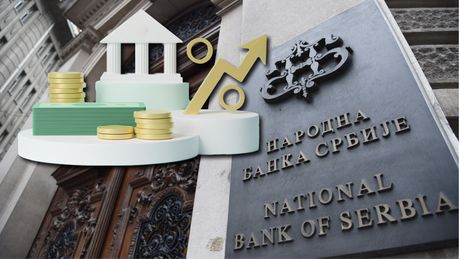Serbian central bank (NBS) makes new decision regarding key policy rate

At its meeting today the NBS (National Bank of Serbia) Executive Board kept the key policy rate at 6.50%. The rates on deposit (5.25%) and credit (7.75%) facilities also remained unchanged.
The NBS explained its decision by saying that the Board’s decision reflects further easing of global inflationary pressures, the downward trajectory of inflation at home and its expected return within the NBS target band over the monetary policy horizon.
The Board also took note of the past tightening of monetary conditions and the fact that the full effects of earlier hikes of key interest rates are yet to play out.
"The pass-through of key policy rate increases so far to the rates in the markets of money, loans and savings signals the efficiency of the monetary policy transmission mechanism through the interest rate channel. However, being determined to curb inflation, the NBS decided to withdraw a portion of high excess dinar liquidity via reserve requirements, and thus tighten monetary conditions additionally. The Board does not exclude the possibility of further monetary tightening, if necessary," the central bank said.
Global inflationary pressures weakened further, mainly on account of lower global energy and primary commodity prices, which are still much below the 2022 figures, as well as the elimination of supply bottlenecks and the effects of monetary tightening by leading central banks, a statement added.
According to the NBS, y-o-y headline inflation in the euro area, our key economic partner, remained unchanged in August relative to July, while core inflation declined to the level of headline inflation. In making its future decisions, the ECB will follow a data-dependent approach, aware of the uncertainty surrounding the pace of disinflation amid a continued rise in euro area wages, record low unemployment and high profit margins.
The Fed took a similar position at its last meeting, though the disinflation process in the USA is faster than in the euro area. The NBS Executive Board urges monetary policy caution over geopolitical tensions and risks, though reduced, concerning the prices of energy products and their availability going forward, including global primary agricultural commodity prices, stated the NBS.
"Y-o-y inflation in Serbia has been on a downward path since April. It slowed down additionally to 12.5% in July, with deflation recorded at the monthly level, which is in line with earlier estimates of the NBS. The inflation slowdown is largely attributable to the slower pace of growth in processed food and energy prices, as well as prices within core inflation that returned to single digits in June and equalled 9.4% y-o-y in July.
The Executive Board expects y-o-y inflation to continue on a downward path, receding on average by around 1 pp a month, and settling at around 8% by year end. The described inflation trajectory will also be supported by the weakening of global cost-push pressures and the drop-out of food and energy price hikes in H2 2022 from the y-o-y inflation rate. The inflation’s downward trajectory and its return within the target band in Q2 2024 will be aided by the effects of monetary tightening, the slowing of imported inflation and the expected further fall in inflation expectations," the central bank announced, adding:
"GDP growth stepped up to 1.7% y-o-y in Q2, in line with the SORS flash estimate. Economic growth in H1 2023 thus came at 1.3% y-o-y, consistent with the NBS projection of 2–3% growth at the level of the year. Such growth outcome is underpinned mainly by net exports owing to the rise in goods and services exports despite the weaker outlook for global economic growth this and the next year amid tightened conditions in the international financial market, pandemic-induced structural changes, and lower investment. In its monetary policy decision-making, the Executive Board also took into account the risk that weaker external demand could to some extent weigh down on Serbia’s manufacturing output and exports in the coming period."
The NBS will continue to keep a close eye on key inflation factors from the domestic and international environment and to make decisions depending on the inflation outlook. At the same time, it will strive to maintain financial stability and support continuous economic growth, a further rise in employment and a favorable investment environment, the statement concluded, noting that the next rate-setting meeting will take place on October 6.
(Telegraf Biznis)
Video: Teška saobraćajna nesreća na Novom Beogradu
Telegraf.rs zadržava sva prava nad sadržajem. Za preuzimanje sadržaja pogledajte uputstva na stranici Uslovi korišćenja.

